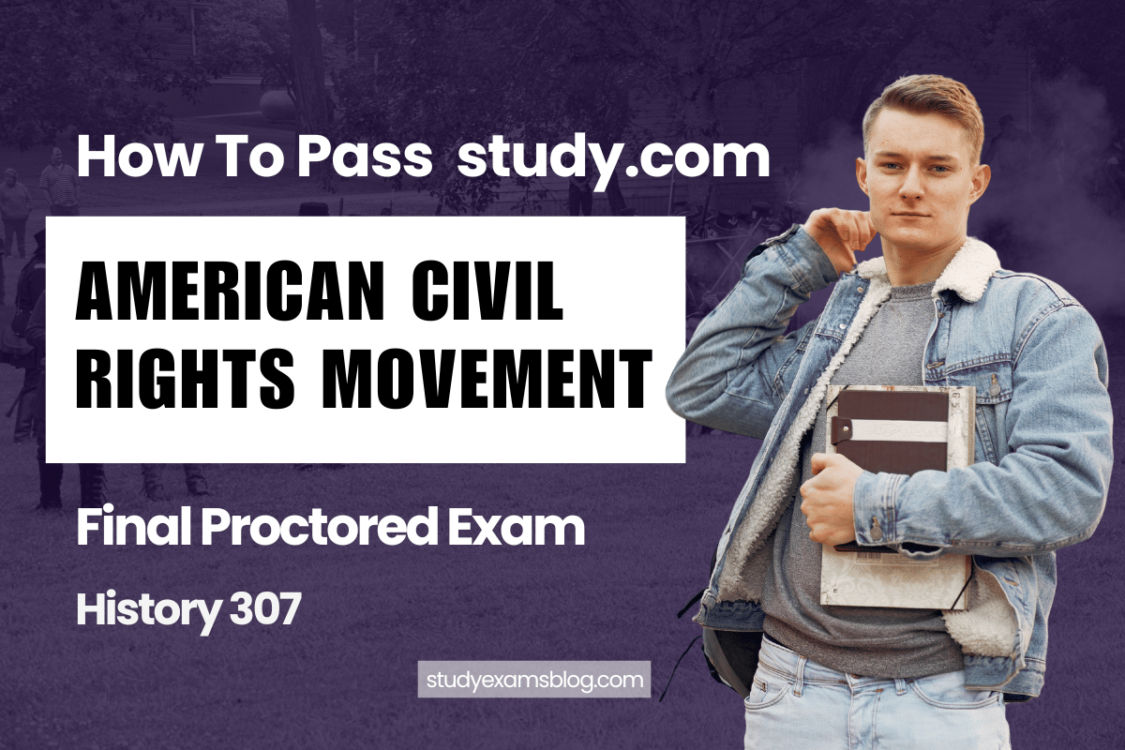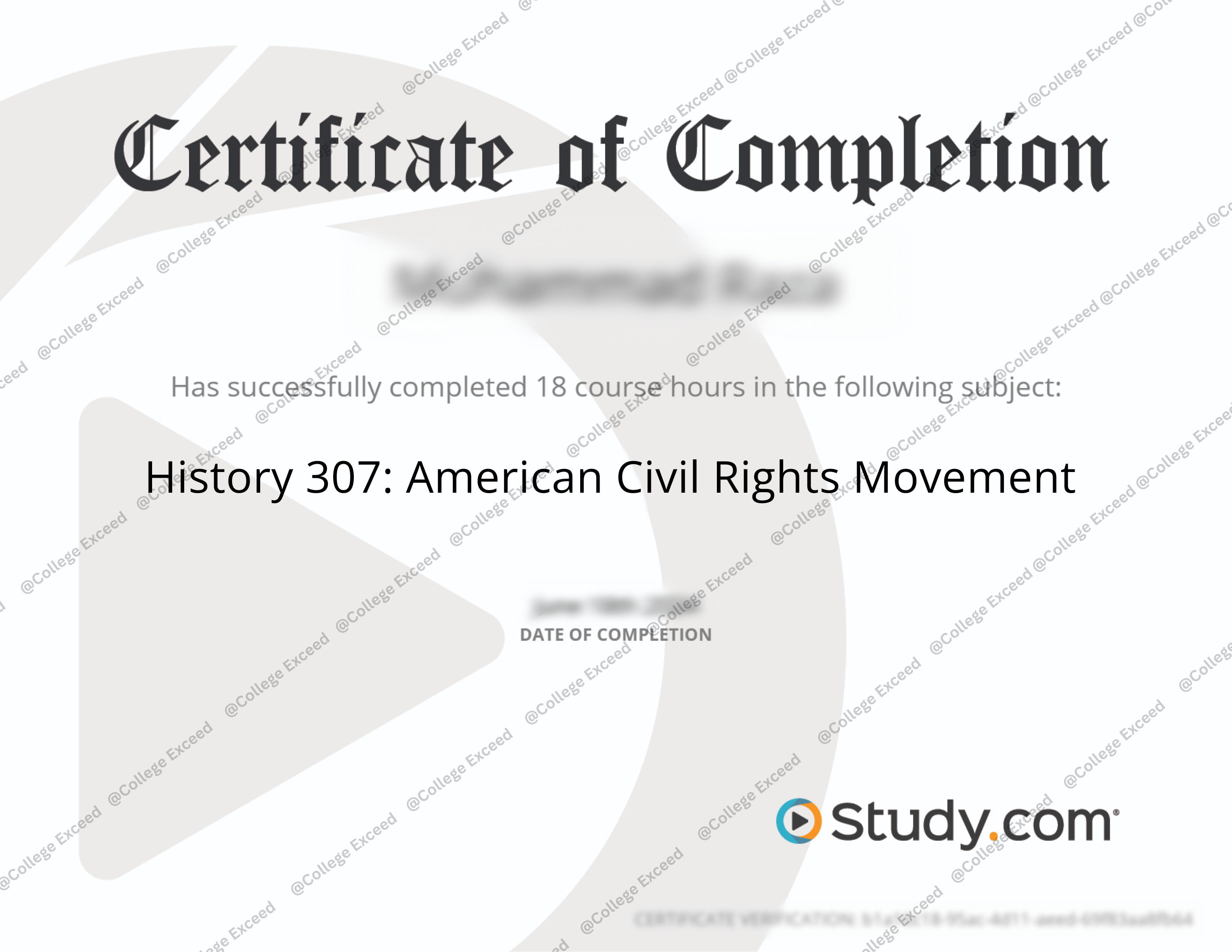
-
Gavin Walton
- October 22, 2024
Before starting your study journey, there are a few things that you should consider regarding study.com History 307: American Civil Rights Movement. You are about to enter an exciting process that will help you learn one or another part of the social change that occurred in America. This course builds on another in a chronological examination of the American Civil Rights Movement from the twentieth century to the present. Here, you will find out about the great leaders of the past, the important events that shaped today’s America, and the many battles that were crucial to the formation of modern America.
But do not worry – despite the fact that it may look like a lot, it will also be quite interesting: why do the heroes of the previous works dare to change the paradigm of society? From the bus boycotts and sit-ins to leaders with Martin Luther King Jr. and Malcolm X, this course isn’t only a kind of history text; it gives an insight into the genesis of modern social justice movements. Well, of course, I will guide you to definitely crack this final exam along with some useful tips and useful sources. Join me now and let’s make studying more fun and get you the passing grade that you need!
---

What to Expect from Study.com History 307 Class📖
Let us proceed and define what precisely study.com American Civil Rights Movement History 307 is all about. However, it’s not just about dates and speeches – this class dissects the significant events and social relations that promoted the equality struggle in the U. S. To put simply, you will analyze such turning points of history as the abolishment of the Jim Crow laws and the Brown v. Board of Education decision, as well the significant movements like the Montgomery Bus Boycott and the March on Washington.
Be prepared to talk about most of the legal strategies of the civil rights movements that opposed segregation and some of the vigorous undertakings of some civil rights associations and civil rights activists including the Black Panther Party. But it also exclusively deals with leaders, for instance, Martin Luther King Jr, but also other prominent figures like Malcolm X, Rosa Parks; and organizations, including SNCC (Student Nonviolent Coordinating Committee). Scholars stress the observation that many of these topics are repeated in the final exam and focus more on the causes and effects of key events instead of names quite often than not such as the Voting Rights Act of 1965 and the Civil Rights Act of 1964.
You will also get to know more about the effects of the movement in the future. In what ways did it affect other activist movements such as the women’s rights and the LGBTQ+ movements? What was the fate of the movement after 1968, when the movement revealed the signs of stalling? After completing this course, you will be more knowledgeable as to how the impacts of the Civil Rights Movement are still seen in today’s society and its discourse on race. That may seem like a lot, but don’t worry, we will focus on the principles on a week-by-week basis.
Week-by-Week Study Plan to Ace Study.com History 307 Exam📝
Preparing for study.com History 307: American Civil Rights Movement doesn’t have to be overwhelming. Here’s a week-by-week breakdown to help you stay on track and ace that final exam:
Week 1: Get Familiar with the Course Material
Begin with the first couple of chapters’ introduction videos as well as lessons. Record some of the important events such as the civil rights movement, its earliest stages, and civil rights movement supreme court cases such as; Brown v. Board of Education. Contrary to other assignments, do not Discard quizzes because they are wonderful for checking the progress of a student in early classes. Check out this quick explainer on the Jim Crow laws for extra context: Jim Crow Laws — YouTube Videos: YouTube Video on Jim Crow Laws.
Week 2: Focus on Direct Action & Key Figures
For this week, see the demonstrations and campaigns of the 1950s and the 1960s. Learn about the Montgomery Bus Boycott or other movements such as Martin Luther King Jr. and Malcolm X. Learn about the freedom rides and the means through which it led to change. For additional help, take a look at this playlist on the Civil Rights Movement: Civil Rights Playlist.
Week 3: Master the Legislative Milestones
Emphasis on the Act ended 1964 such as the Civil Rights Act of 1964 and Act of 1965, Voting Rights Act of 1965. These are very important in the final exam, so you should dedicate more time to them. Also, explore how Shelby County v. Holder affects today’s voting rights. Quiz yourself using flashcards: Civil Rights Flash Cards By Quizlet.
Week 4: Review and Practice Essays
This week is devoted to the revision of the materials, which were the focus during the previous week, and the practice essays. Go back to read source texts, such as the Letter from Birmingham Jail, written by Martin Luther King, Jr., and the Emancipation Proclamation. Ensure you comprehend the basic contention of the piece and are ready to evaluate them as well. Try using Grammarly to help with writing and clarity.
Week 5: Take the Practice Test
By now, you should feel pretty confident with the material. Take the study.com practice test to see where you stand. Focus on areas where you scored lower, and review the chapters you’re still shaky on. Brush up on key court cases and events using this timeline tool: Interactive Civil Rights Timeline.
Week 6: Final Review and Exam Prep
It’s crunch time! Revisit your notes, take quizzes, and review past assignments. Practice essay questions and memorize key events. Don’t forget to go over your weaker areas from Week 5, and use YouTube channels like CrashCourse to quickly refresh concepts: CrashCourse Civil Rights Movement.
---
Free Resources to Explore the Civil Rights Movement📂
- YouTube Channels
- CrashCourse: Their U.S. History playlist covers essential Civil Rights topics in an engaging and concise way. Check it out here: CrashCourse US History.
- Khan Academy: Excellent breakdowns on key civil rights events. Here’s a link to their Civil Rights Movement videos: Khan Academy – Civil Rights Movement.
- Flashcards and Quizzes
- Quizlet: Use their Civil Rights Movement flashcards to quiz yourself on important figures, laws, and events. Try it here: Quizlet – Civil Rights Movement Flashcards.
- Podcasts
- “Teaching Hard History: American Slavery” by Learning for Justice: While this is strictly on slavery, it gives a background to the social and legal problems that led to the Civil Rights Movement. You can listen to it here: Teaching Hard History Podcast.
- Primary Sources
- The King Center: This site offers the Audio/Video of speeches, Letters, and Other documents of Dr. Martin Luther King Jr. It’s a great place to get a deeper understanding of his role in the Civil Rights Movement: The King Center – Archives.
- Interactive Tools
- Interactive Civil Rights Timeline: This timeline helps visualize major events in the Civil Rights Movement, perfect for understanding the chronological flow of the movement: Civil Rights Timeline.
---
Key Leaders and Events to Focus On in Civil Rights History🔑
In study.com History 307: American Civil Rights Movement, there are specific topics that need to be understood before taking the final exam. Let’s break them down to make things easier:
- Civil Rights Act of 1964 vs. Voting Rights Act of 1965
For whatever reason, these two landmark legislations are often the subjects of assessment, so students must learn how they have been changed.
Civil Rights Act of 1964 | Voting Rights Act of 1965 |
|---|---|
Ended segregation in public places and banned employment discrimination based on race, color, religion, sex, or national origin. | Prohibited racial discrimination in voting, particularly in southern states where voter suppression was rampant. |
Impact: Desegregated schools, public transportation, and public facilities. | Impact: Allowed millions of African Americans to vote, drastically changing voter demographics in the South. |
- Martin Luther King Jr. vs. Malcolm X
These two leaders had quite opposing philosophies for attaining equality, and these are usually pitted against each other.
Martin Luther King Jr. | Malcolm X |
|---|---|
Advocated for nonviolent resistance and civil disobedience. | Initially promoted Black nationalism and self-defense, but later softened his views. |
Famous for the I Have a Dream speech and peaceful protests like the Montgomery Bus Boycott. | Known for his fiery rhetoric and criticism of integration, later aligning with the broader Civil Rights Movement. |
Worked closely with organizations like the Southern Christian Leadership Conference (SCLC). | Was a key figure in the Nation of Islam before breaking away. |
- The Role of the Supreme Court
Below, several Supreme Court cases are critical for the interpretation of the Civil Rights Movement. Let’s highlight two:
Case | Significance |
|---|---|
Brown v. Board of Education (1954) | Declared racial segregation in public schools unconstitutional, overturning Plessy v. Ferguson. This case helped dismantle Jim Crow laws. |
Shelby County v. Holder (2013) | Weakened the Voting Rights Act by eliminating the preclearance requirement, which had prevented discriminatory voting practices in certain states. |
- Direct Action vs. Legal Action
The arguments against segregation and racism were done both politically; through protests and boycotts and through lawsuits.
Direct Action | Legal Action |
|---|---|
Includes sit-ins, boycotts, and protests (e.g., the Montgomery Bus Boycott, Greensboro Sit-Ins). | Relied on court rulings to dismantle segregation (e.g., Brown v. Board of Education). |
Aimed to create immediate, visible change. | Sought long-term, systemic change through legal precedents. |
Often met with violent opposition but garnered widespread attention. | Sometimes slower but achieved more lasting reforms. |
---
Study.com History 307 FAQ ❓
- In order to pass this course how many quizzes am I required to complete?
Another method that’ll make you feel like you’re constantly being tested, is that you’ll be taking quizzes after almost every lesson. You are allowed to take the three quizzes and the highest score will be considered for your submission. The star ratings are equal to 100 of the 300 points in total needed to pass so don’t miss the quizzes! Ideally, you should get at least 80 percent for every one of them.
- What is the preferred method of preparation for the final examination or test?
Concentrate on what you remember, such as the Civil Rights Act of 1964 and the Brown- v- Board of Education. It is also good for understanding major figures like Martin Luther King Jr. and Malcolm X. One may go through the practice test available at study.com and utilize the study plan that we outlined above as a guideline for your preparation.
- Which primary sources should I read in preparation for the exam?
Yes! Some important documents that one should be well versed with are the Letter from Birmingham Jail by Martin Luther King Jr., the Emancipation Proclamation, excerpts from Brown v. Board of Education, etc. These will be useful while preparing for the exam as well as the assignments that we shall be required to write.
- Is everything in the course about the South or does it include the whole of the U. S.?
As much as the civil rights movement is epitomized by the ‘Southern movement’, this course will equally look at the Northern and the Western movements. Together, you’ll discover the racism and segregation all over the state including the redlining in the Northern cities and the Watts riots in Los Angeles.
- Is it possible for me to take the final exam again if I fail?
Yes! You are allowed to do the final exam twice though there is a three-day gap between the two exams. If the candidate does not succeed, he or she can take more time to attempt it and use the practice test and the review materials that are provided.
---
Final Reflections on Learning about the Civil Rights Movement📄
The study.com History 307: American Civil Rights Movement course is one of the most significant periods of change in United States history. Starting with the Civil Rights Act of 1964 all the way to the powerful speeches of Martin Luther King Jr. and Malcolm X This course will be filled with information that you will need to understand that the fight for black rights was and is far from over.
In order to perform well in this course, it is very important to have certain knowledge regarding the concepts, movements, and legal cases related to this movement. Follow the study schedule, use the offered outside sources that are not covered in the materials, and every now and then take a quiz or test yourself with flashcards. With persistent study and concentration on the basic themes, the exams should be an easy hurdle to overcome. Good luck, and keep in mind that civil rights is not only the past but the present and future that is changing the world!



